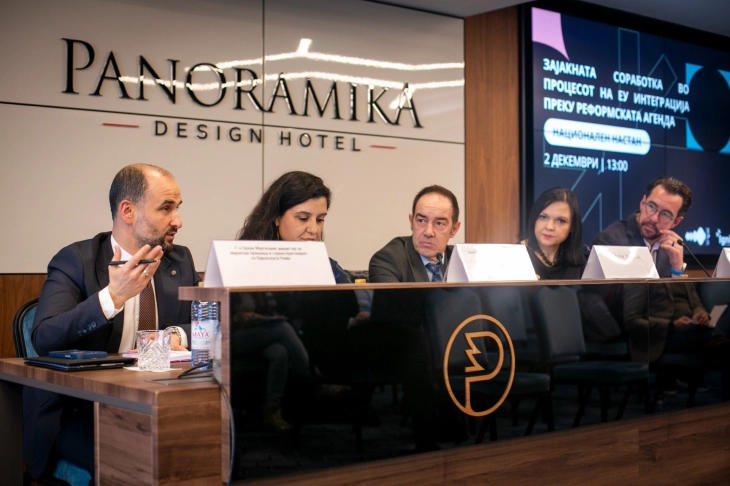Reforms work only if impacting citizens' daily life: panel discussion
- Reforms work only if they impact citizens' daily life. They must create institutions that people trust, economies that generate opportunities and societies that are inclusive and just, Minister of European Affairs and EU Chief Negotiator Orhan Murtezani told a panel discussion on the Reform Agenda on Monday.

Skopje, 2 December 2024 (MIA) - Reforms work only if they impact citizens' daily life. They must create institutions that people trust, economies that generate opportunities and societies that are inclusive and just, Minister of European Affairs and EU Chief Negotiator Orhan Murtezani told a panel discussion on the Reform Agenda on Monday.
In the discussion dedicated to the enhancement of the dialogue on the Growth Plan for Western Balkans, hosted by the European Policy Institute (EPI), Minister Murtezani highlighted the significance of the Reform Agenda and understanding of the reform processes as a political necessity but as a personal engagement as well.
"Reforms are more than a strategic necessity - they measure our maturity as a state. They reflect our capability to build resilient institutions, efficient and transparent democratic governance and demonstration of the commitment that leads to tangible progress and better quality of life in the future," said Murtezani.
According to him, the Reform Agenda requires us to manage the long-term shortcomings in the public administration, judiciary and regulatory framework, while adding that reforms do not only serve to correct the dysfunctionality but also to build a culture of accountability and responsibility, where governance is based on trust, inclusivity and results that enhance people's lives.
"What makes the Growth Plan especially powerful is its double function: it stimulates economic development while strengthening the pace of the accession process. This is especially significant for North Macedonia. The promise of shared prosperity through market integration is perfectly overlapping with the reforms that are being implemented - from infrastructure modernization to creating an environment in which businesses can prosper. Nevertheless, I must stress that the Growth Plan is not a replacement for reforms, it is a catalyst for deeper and more sustainable changes," said Murtezani.
He added that the challenge for North Macedonia is to turn these ambitious plans into reality, echoing on all levels - judiciary independence, education standards and regional networking.
"That is why I believe that reforms are not the ultimate goal but a continued process. They require perseverance, patience and firm belief in the power of change. The reform path is neither linear nor easy, with periods of frustration in between. But we must remind ourselves why we are following it. We are doing this because we believe in the goal of North Macedonia not only joining the European Union but being a country that would stand proud among its neighbors, strengthened by the thorny path and the lessons it learned along the way," underlined Murtezani.
EPI's Simonida Kacarska said they are launching comprehensive discussions on the Reform Agenda together with the Ministry of Foreign Affairs, supported by the Western Balkans Open Society Foundations.
"The objective is to start a discussion together with the chambers, academia and experts on how to follow the reform agenda and how can the other stakeholders be involved, since this is a new EU instrument that is applied in member-states according to modalities that are new to the region," said Kacarska.
She added that the Agenda sets clear objectives and indicators that the country must meet every six months, which will be key for the payment of the Growth Plan funds by the European Commission, noting "this is a new model that is different from what we had before with the Instrument for Pre-accession Assistance (IPA)."
Photo: Ministry of European Affairs







